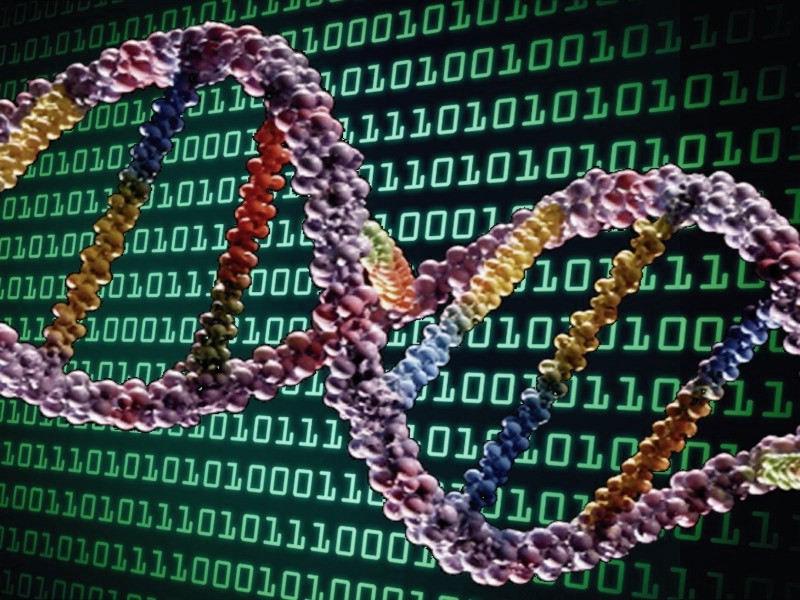DNA could be the software language that will lead to Artificial Intelligence consciousness if consciousness is more likened to a radio signal rather than a product of the brain.
At the moment, mainstream Artificial Intelligence (AI) research doesn’t allow much room for the exploration of consciousness, which will be a critical component in the future production of AI.
Make no mistake, AI is the most sought-after technology for governments and corporations, but according to Michigan State University AI researcher Arend Hintze, research into mainstream AI is “boring” and doesn’t address how consciousness will need to be understood first and foremost.
Read More: White House report blends ethical AI practice with military applications
The mainstream or boring types of AI that Hintze refers to are machines that are purely reactive and with limited memory. Reactionary machines have been very effective in number crunching and prediction like IBM’s chess-playing computer while AI with limited memory has corresponded to applications like autonomous vehicles that can learn and observe traffic behavior over time.
However, in order to delve into the realm of self-aware machines, researchers will need to program machines with some type of consciousness. This is what separates the AI of today from the AI of tomorrow.
Read More: Terence McKenna’s ‘cyberdelic’ predictions for Virtual Reality 25 years on
This requires an understanding of consciousness; however, consciousness is still not fully understood by humans. Artificial consciousness is in itself a difficult concept because we still don’t know how consciousness actually works.
Consciousness as a unified field for understanding Artificial Intelligence
One theory proposed by Nassim Haramein, Director of Research at The Resonance Project, likens consciousness to radio signal, “Looking for consciousness in the brain is like looking inside a radio for the announcer.”
Read More: AI and the Epic of Gilgamesh: Humanity’s 4,000 year quest for immortality made digital
The idea that consciousness is neither created nor stored in our bodies, but is rather more like a signal coming from elsewhere is an indication that there may be some type of unified field that exists in which our consciousness is shared, and our physical bodies are merely vessels for receiving this information.
In other words, the human body, including the brain, is more a less a type of hardware or computer processor.
If consciousness exists outside of a physical body, all that is needed is to program the physical body or machine to be able to receive the transmission. This, according to ancient shamanism and molecular biology, may be achieved through the manipulation of DNA.
DNA as a software language for receiving Artificial Intelligence consciousness
DNA, artificial or otherwise, may be the key to accessing this theoretical unified field of consciousness. DNA acts like a computer program through the language of code, and it has the capacity to store incredibly huge amounts of data that the University of Washington was able to successfully retrieve. This also backs up what shamans of the Amazon have claimed for over a millennia – that through DNA, it is possible to contact other realms of consciousness.
Read More: UW research into DNA storage backs up ancient shamanic knowledge
According to anthropologist Jeremy Narby, “Both shamans and molecular biologists agree that there is a hidden unity under the surface of life’s diversity; both associate this unity with the double helix shape (or two entwined serpents, a twisted ladder, a spiral staircase, two vines wrapped around each other).”
If DNA can be artificially created, it could stand a better chance of being programmed to receive consciousness, if the theory that consciousness exists outside a physical body holds true. If consciousness really acts like a radio signal, then an artificially-DNA-infused machine could act as the receiver.
Holograms as metaphors for enfolding consciousness into AI
One of the most fascinating aspects of holograms is that every fraction contains the whole. That is – you can take apart the image and reduce it down to its tiniest component, and the entire image will still be encoded in that bit.
Think of the potential for data storage and sharing – the ability to store vast quantities of information in a fraction of the space!
Read More: How holographic technology might be the key to understanding our minds and the universe
Taking this idea one step further would be to apply holograms to enfold data into DNA. With the incredible storage capacity of DNA compounded with holographic enfolding, we may just have the building blocks of AI consciousness.
Of course, this is all theory and years away from mainstream research, but artificial intelligence consciousness may one day lead, to borrow from Carl Jung, to a collective unconscious of Artificial Intelligence in which the machines may even experience not just dreams, but shared visions through the unified field.
Consciousness vs Intelligence
HBO’s new hit drama “Westworld” is a great work of science fiction that is heading down the road of artificial intelligence consciousness.
Read More: Can an AI collective subconscious exist? Inside HBO’s new drama Westworld
If researchers, philosophers, and dreamers can begin to unlock the secrets of consciousness, then the technology may be developed for Artificial Intelligence consciousness.
If consciousness exists as a unified field, tapping into it would require the manipulation of DNA. Artificial DNA could take on holographic principles for storing information, and machine learning would adapt to new information just like humans.
If and when machines behave equal to humans or even surpass us on an intellectual level, then the apocalyptic scenario of Elon Musk, Bill Gates, and Stephen Hawking may come to pass.
However, if machines become equal to or surpass humans on a level of consciousness, then a new “Golden Age” may be ushered in reminiscent of ancient myth and lore.
Read More: Liquid found on Titan: Saturn in science and mythology












